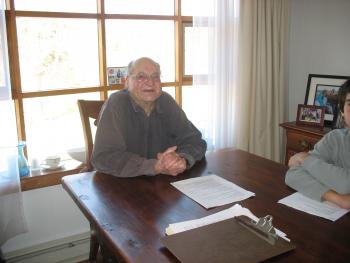Oscar Bunting

Nantucket Lighthouse Middle School Interviews
Students of the Nantucket Lighthouse Middle School, with assistance from Georgen Charnes and Gail Clark, interviewed several Nantucketers with positions related to the waters of Nantucket in the spring of 2011. Copies of these interviews are archived at Nantucket Historical Association Research Library.
National Capital Contracting
Oscar Harold Bunting was born on August 12, 1931, in Bishop, Maryland. He was raised in Wisconsin and served four years in the Navy, after which he worked at the Straight Wharf Garage before working as a scalloper in 1952. He began scalloping in Nantucket, Massachusetts and continued in this profession for over five decades. Bunting's experience included independent commercial scalloping, primarily around Nantucket, Tuckernuck, and Muskeget. Bunting's father, a former Coast Guard member, also scalloped until his mysterious disappearance at sea. In addition to scalloping, Bunting engaged in other fishing activities, such as bluefishing, bass fishing, and cod fishing. He sold codfish on Main Street in Nantucket and rented boats at Jetties Beach during the summer, offering sailing and water skiing services. He retired from active scalloping at age 69 and reflected positively on his life working on the water.
Scope and Content Note
The oral history interview with Oscar Bunting, conducted at his home in Old South, Nantucket, Massachusetts, captures his extensive experiences and insights as a scalloper. The interview details Bunting's personal history, including his early life in Wisconsin and his service in the Navy. It covers his career shift to scalloping in 1952 and his subsequent five-decade-long involvement in the industry. Bunting describes the practical aspects of scalloping, including techniques for locating and harvesting scallops, the physical demands of the job, and the economic fluctuations affecting the trade. He discusses the evolution of scalloping practices and equipment, transitioning from manual hauling to more mechanized methods. Bunting elaborates on the ecological factors influencing scallop populations, such as the impact of eelgrass and the challenges posed by the brown tide. The interview also touches on regulatory changes over the years and the impact on local scallopers. Additionally, Bunting recounts personal anecdotes, including the disappearance of his father at sea, his own close calls while scalloping, and his various entrepreneurial activities, such as selling codfish and renting boats. The interview concludes with Bunting's reflections on his career and the broader changes in the fishing industry.
Please Note: The oral histories in this collection are protected by copyright and have been created for educational, research and personal use as described by the Fair Use Doctrine in the U.S. Copyright law. Please reach out Voices@noaa.gov to let us know how these interviews are being used in your research, project, exhibit, etc. The Voices staff can help provide other useful resources related to your inquiry.
The NOAA mission is to understand and predict changes in climate, weather, oceans, and coasts, to share that knowledge and information with others, and to conserve and manage coastal and marine ecosystems and resources. The Voices Oral History Archives offers public access to a wide range of accounts, including historical materials that are products of their particular times, and may contain offensive language or negative stereotypes.
Voices Oral History Archives does not verify the accuracy of materials submitted to us. The opinions expressed in the interviews are those of the interviewee only. The interviews here have been made available to the public only after the interviewer has confirmed that they have obtained consent.
